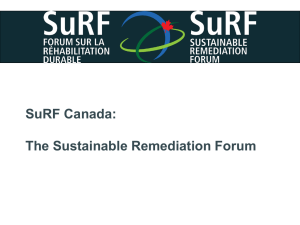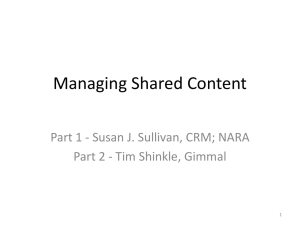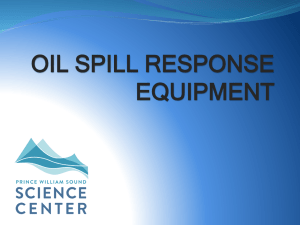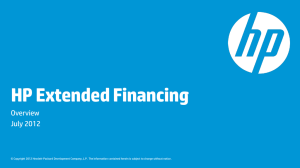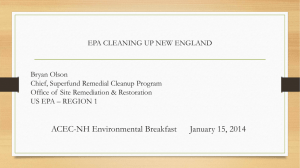Drycleaning Solvent Cleanup Program
advertisement
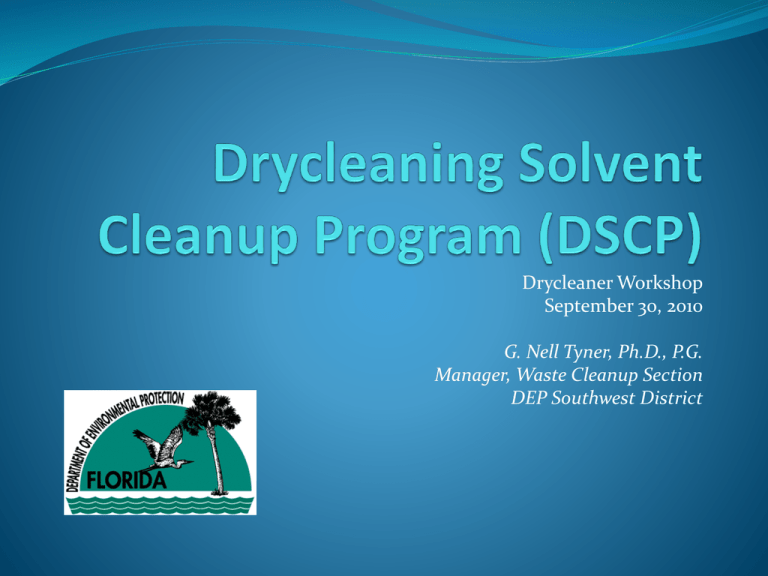
Drycleaner Workshop September 30, 2010 G. Nell Tyner, Ph.D., P.G. Manager, Waste Cleanup Section DEP Southwest District Drycleaning Solvent Cleanup Program (DSCP) The DSCP bill was sponsored by the Florida Drycleaners Association. Program created in 1994 by the Florida Legislature to provide a source of funding for rehabilitating sites and drinking water supplies contaminated by drycleaning solvents. Chapter 376 of the Florida Statutes (F.S.) DSCP The Program was created to: Identify facilities contaminated by drycleaning solvents. Establish a Trust Fund to pay cleanup costs. Provide limited immunity to owners, operators and/or real property owners. Eligibility does not relieve the owner, operator or real property owner from federal actions or from current waste management requirements. Program Initiation • The DSCP was open for voluntary joint application by drycleaning and wholesale supply facility owners, operators, and real property owners from March 1996 through December 31, 1998. • Active or inactive drycleaning facilities, drycleaning wholesale supply facilities, and coin-operated drycleaning facilities could apply for cleanup if they had evidence that a discharge of contaminants had occurred. • 1,422 sites of the 1,563 that applied to the Program were deemed eligible for cleanup. Funding/Budget Four funding sources: • 2% gross receipt sales tax • $5 per gallon tax on perchloroethylene (PCE) solvent • $100 annual registration fee • Single deductible fee of $1,000, $5,000 or $10,000 based on the date of application to the DSCP Budget • Fiscal year 2010/2011 = $ 4 million Site Scoring • The Department undertakes cleanup of eligible drycleaners on a priority basis. • Eligible sites are scored using a system set out in statute (Section 376.3078 (7), F.S.). This scoring system accounts for: – – – – – – – proximity of drinking water supply wells; the population served by those wells; hydrogeologic data for the site; aquifer characteristics; the probability of a continuing contamination source; environmental setting; and fire and/or explosion hazard Cleanup of Eligible and Ineligible Sites Fund Eligible sites: Site rehabilitation of eligible sites is handled through the Bureau of Waste, Hazardous Waste Cleanup Section in Tallahassee. State contractors are hired. Sites are tasked to contractors according to priority. Eligible sites that want to clean up sooner, may spend their own money and file for voluntary cleanup tax credits (VCTCs). Fund Ineligible Sites: Facilities that are not eligible (includes those with releases after 1998) must complete cleanup of releases at their own expense. Cleanup Criteria Rules • The Drycleaning Solvent Cleanup Criteria rule (Chapter 62-782, Florida Administrative Code [F.A.C.]), provides cleanup procedures for sites contaminated with drycleaning solvents. • The Contaminant Cleanup Target Level Rule (Chapter 62-77, F.A.C.) provides cleanup target levels for groundwater, surface water, and soil as well as natural attenuation default concentrations for groundwater. • Site assessment and remediation are conducted pursuant to these two rules. Remedial Strategy • The Program’s remedial strategy is to perform active remediation in source areas and to apply Natural Attenuation Monitoring (NAM), where appropriate, for low-level contaminant plume areas. • Active remediation of a site may require a single remedial technology or a combination of technologies. • To date, approximately 72% of sites with a completed site assessment have required active remediation for site cleanup. • Emphasis is on using in-situ treatment technologies in order to minimize system operation and maintenance costs. DSCP Statistics 1,422 sites are eligible for the DSCP. 143 sites have been issued a Site Rehabilitation Completion Order (SRCO) including Voluntary Cleanup sites. 189 sites are currently in assessment, remediation, or monitoring. 1,090 sites are waiting to be cleaned up under the DSCP. Voluntary Cleanup Tax Credit (VCTC) • In 1998, the Florida Legislature created the VCTC program to encourage participants to conduct voluntary cleanup of certain drycleaning solvent contaminated sites and Brownfield sites in Designated Brownfield areas. • Participants may be private or public entities, but they must meet the eligibility criteria established under statute and must enter into a Voluntary Cleanup Agreement (VCA), for drycleaning solvent cleanup, or a Brownfield Site Rehabilitation Agreement. • Tax credit certificates are awarded by the DEP from an annual $2 million authorization and are valid against Florida Corporate Income Tax. Tax credit awards in excess of $2 million for any given fiscal year are issued from the next available tax credit authorization. Voluntary Cleanup of Eligible Sites All eligible DSCP sites may be eligible for VCTC. However, the deductible due to the DCSP must be paid prior to or included in the first VCTC application. If pursuing voluntary cleanup, a VCA must be executed with the DEP and: RPO (even if also DF O/O) MAY receive statutory immunity and MAY be eligible for VCTC for voluntarily conducting cleanup. DF O/O MAY be eligible for VCTC for voluntarily conducting cleanup but MAY NOT receive statutory immunity. Ineligible Sites Real property owners (RPOs) and/or Drycleaning Facility Owner(DF O/Os) are liable under 62-782 (subject to certain defenses) and must clean up ineligible sites, but each has different options for cleanup: RPOs (who are not also DF O/Os), MAY enter into a Voluntary Cleanup Agreement (VCA) with the DEP, MAY receive statutory immunity, and MAY be eligible for VCTC for conducting cleanup. If RPOs are also DF O/Os, then they are NOT eligible for VCTC and MUST cleanup under 62-782, but MAY clean up under VCA and MAY receive statutory immunity. DF O/Os are NOT eligible for a VCA or VCTC, and must clean up under Chapter 62-782, F.A.C. Cleanup Process for Ineligible Sites Requirements for cleanup process are in Chapter 62-782, F.A.C. including timeframes for completion: First step is to complete a site assessment to characterize the nature and full extent of the contamination. Site assessment must be initiated within 60 days of discovery of a release. Notice of field activities should be given prior to performing the tasks needed to complete the site assessment. Site Assessment Report must be submitted within 270 days of discovery of the release. After site assessment, remedial action (passive or active) needs to be undertaken to meet the requirements for cleanup. Cleanup of ineligible sites is overseen by staff in the DEP’s District offices. Third Party Liability Insurance: • The law requires the owner or operator of a drycleaning facility or wholesale supply facility to purchase third-party liability insurance to provide $1 million coverage for bodily injury and property damage caused by an incident of contamination. • The requirement to obtain insurance only applies if the third party insurance is available at a reasonable rate as determined by the Florida Department of Insurance (DOI). • Currently, the DOI has not determined that there is an insurance product(s) that will meet the program requirements and is available at a reasonable rate. Therefore, DEP has not required facilities to obtain and maintain the third-party liability insurance. Program Links and Contacts • Florida DEP DSCP web page http://www.dep.state.fl.us/waste/categories/drycleaning/default.htm • Florida DEP Voluntary Cleanup Tax Credit http://www.dep.state.fl.us/waste/categories/vctc/default.htm • Florida DEP Small Business Environmental Assistance Program http://www.dep.state.fl.us/air/emission/sbeap/sbeap.htm • Compliance Assistance Program for Drycleaning Facilities http://www.dep.state.fl.us/waste/categories/hazardous/pages/DryCleanComplia nce.htm • State Coalition for the Remediation of Drycleaners http://www.drycleancoalition.org • SW District contacts: http://www.dep.state.fl.us/southwest/contacts/
